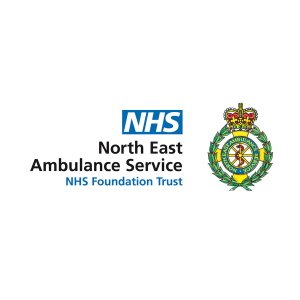North East Ambulance Service (NEAS) - Experts & Thought Leaders
Latest North East Ambulance Service (NEAS) news & announcements
Representatives from Esh Construction, Tyne and Wear Fire and Rescue Service (TWFRS), Northumbria Police, North East Ambulance Service, and local primary schools have taken part in a steel signing event to mark the completion of the first phase of work on the state-of-the-art Hebburn Tri-Station. Steven Bewick, Station Manager for Hebburn Community Fire Station, Louise Norris, Locality Manager at North East Ambulance Service, and Neil Hall, Chief Inspector at Northumbria Police, joined Esh Construction, along with students and staff from Toner Avenue Primary School, St Aloysius RC Primary School, and Hebburn Lakes Primary School to sign the building’s steel framework. first carbon-neutral station Located on a vacant site between Marine Drive and Campbell Park Road in Hebburn, the new station is set to be the first-of-its-kind in the country to be carbon neutral. It will include staff accommodation and appliance bays for emergency vehicles, as well as a free-standing training building. Externally, the site will feature charging ports, with a view to all three services having a fleet of electric vehicles. It is expected to be operational by Spring 2024. Key milestone The building frame is made up of 585 hot-rolled steel girders weighing 151 tonnes The building frame is made up of 585 hot rolled steel girders weighing 151 tonnes which were installed by Sunderland-based company, Harry Marsh (Engineers) Ltd. Kate Marshall-Nixon, Social Value Manager at Esh Construction, said, “I am proud to be part of the ceremony to mark this key milestone within the construction phase." Community engagement Kate Marshall-Nixon adds, "This is the first of many opportunities which will see us engage within the community throughout the project, with plans in place to engage with local schools, provide funding, offer work experience placements and apprenticeships, as well as take part in volunteering activities.” Steven Bewick, Station Manager for Hebburn Community Fire Station, said, “We are so proud of the Hebburn Tri-Station project and what it will mean for the people of Hebburn, Jarrow, Monkton Village, and residents in the surrounding areas of South Tyneside." day-to-day operations The steel signing was a fun way of representing the community ownership aspect of the building" Steven Bewick adds, “The way it will house and embrace the day-to-day operations of each blue light organization, and how the officers will be working alongside each other under the same environmentally friendly roof." He continues, “It was great to welcome the young people on-site, as the steel signing was a fun way of representing the community ownership aspect of the building, and how we want people, young and old, to see Hebburn Tri-Station as an integral part of the local area.” sustainable technologies Modern sustainable technologies will be utilized throughout the hub, including solar photo voltaic roof panels, ground source heat pumps, and a rainwater harvesting and reuse system. A wildflower meadow will feature among the landscaping of the grounds to help promote local biodiversity. Procured via the North East Procurement Organisation (NEPO), Esh is working in partnership with Sunderland City Council’s Capital Projects Team, Desco, and Todd Milburn to deliver the project in collaboration with TWFRS.
North East Ambulance Service (NEAS) is supporting Restart a Heart Day, a global initiative launched to raise awareness of the importance of learning CPR to help someone who has suffered a cardiac arrest. Restart a Heart Day Restart a Heart Day takes place on 16 October each year, and NEAS runs events throughout the month. The campaign aims to increase public awareness of cardiac arrests and increase the number of people trained in lifesaving CPR. NEAS will be delivering events, and training 160 people in schools and colleges in Stockton, Redcar, and Billingham. Currently, NEAS has trained 2,250 adults and children in lifesaving skills. Better chance of survival The earlier we act when someone is having a cardiac arrest, the better a person’s chance of surviving" Alex Mason, community development officer at the Trust, said, “Anyone can be affected by a sudden cardiac arrest at any time. It’s important to quickly call 999, perform CPR and use a defibrillator. The earlier we act when someone is having a cardiac arrest, the better a person’s chance of surviving." “For an ambulance crew attending a cardiac arrest, knowing there’s someone there cane to support the patient while the crew is traveling is a great reassurance. It’s heartening for them to know the community is doing their bit in the chain of survival." The Circuit "We have invested in the community offering partial funding in some areas to increase the number of public access defibrillators as well as providing training so that we can help increase the chance of people surviving.” NEAS joined the British Heart Foundation’s The Circuit, a national database of defibrillators. This means health advisors and dispatchers dealing with emergency 999 and urgent 111 calls have access to over 60,000 defibrillators UK-wide. Visible nearest defibrillator Over 30,000 people suffer a cardiac arrest in the hospital in the UK every year Being part of The Circuit means that when calls are taken by NEAS from different parts of the country the details of the nearest defibrillator are visible and so NEAS can ask someone on the scene of an incident to retrieve it to help save a person’s life. Over 30,000 people suffer a cardiac arrest out of the hospital in the UK every year, with less than one in 10 people surviving. The number of cardiac arrests is around 2,100 for the North East, with just one person in 16 surviving. Bystander CPR Millions of people in the UK won’t have had the opportunity to learn this key lifesaving skill putting lives at risk. Bystander CPR increases survival by two to three times, however, it is only delivered in one in five incidents. If we achieved the same survival rates as countries like Norway (25%) – an additional 100 lives could be saved every year.
Alcohol-related call-outs are placing an avoidable demand on nine out of ten North East Ambulance Service staff. And more than three-quarters have been physically or verbally assaulted in the line of duty. In the run-up to December, one of the busiest times of year for 999 control rooms, Balance has released the findings of a new survey of nearly 150 frontline staff from the North East Ambulance Service (NEAS) to show the effect alcohol has on the service. Survey findings The survey of NEAS ambulance employees found: 93% say dealing with intoxicated patients wastes valuable capacity and places avoidable demand on time and resources. Nearly 1 in 3 say HALF or more of the incidences they dealt with over the Christmas period involved alcohol. Almost half of NEAS employees (47%) say that over 75% of call-outs for assaults were related to alcohol. 68% say over half of the call-outs for domestic violence were related to alcohol. 40% have received a threat of injury from patients or members of the public at least SIX times, and 1 in 3 have received an actual injury or verbal abuse on as many occasions. 38% have received sexual harassment/assault whilst on duty from people under the influence of alcohol. Only 1 in 10 (12%) say that they have never been threatened by an intoxicated patient or member of the public whilst on duty. Major call-outs after lockdown restrictions Deaths from alcohol also hit a record high in 2020 with the worst rates in the North East The findings mirror a previous survey from 2015 but mark a period in which alcohol consumption and the associated health harms rose among heavier drinkers during the pandemic. Deaths from alcohol also hit a record high in 2020 with the worst rates in the North East. One unnamed female ambulance crew member said, "While alcohol-related call-outs were common during the first winter lockdown in 2020, ambulance crews noticed an increase in the number of call-outs involving alcohol once lockdown restrictions had been lifted, during November - December 2022, with another colleague commenting.” Additional pressure Call handlers as well as front-line crews face pressures, with time too often taken up dealing with intoxicated patients, with many emergency operation center members reflecting on the difficulty this can cause when triaging patients. Susan Taylor, Head of Alcohol Policy for Balance, said, “The increased risky drinking we saw on the back of the pandemic is likely to lead to thousands of extra cases of disease and premature death. And for 999 crews it has created additional pressure on already stretched services." Impact on emergency services “It is clear that NEAS employees feel that alcohol-related incidents have been increasing and this places a huge emotional and physical burden on them, both on and off duty.”She added, “While many will blame individuals who drink too much for this, we need to remember that alcohol can be an addiction, which some people are struggling with. Heavier drinking since the pandemic is spilling over into more incidents impacting our emergency services." Cheap alcohol rates Alcohol is still too cheap, too available, and too heavily promoted and we need action at the national level" “It is wrong that people can buy a week’s worth of cheap strong alcohol for less than £5. And during the pandemic alcohol companies and supermarkets bombarded us with advertising, encouraging us to drink." "Alcohol is still too cheap, too available, and too heavily promoted and we need action at the national level to protect the health, our NHS, and our emergency services.” Sexual harassment, abuse, and threatening behavior Sexual harassment and abuse are also common for both ambulance crew members and EOC staff. Female respondents in particular are subject to abuse of this nature, with almost half (46%) reporting an incidence of sexual harassment, compared with 28% of male respondents. It is worth highlighting that while patients themselves can be the cause of abuse or disruption, crews also find themselves subject to threatening behavior and harm from family members and friends of the patient, making it difficult to provide appropriate care. Increased assault rates Stephen Segasby, chief operating officer at North East Ambulance Service, said, “The amount of assaults, both physical and verbal, we continue to see is worrying. The effects of alcohol and behaviors of people under the influence can have a huge impact on all of our staff and services." “There is an emotional cost and a financial one for NEAS if staff is assaulted or abused. To do their best for patients in an emergency, our people need to be well and able to work safely." Impact on mental and physical health Nobody comes to work in an emergency service like ours to be put at risk" "Working under such conditions can take its toll on the mental and physical health of our people. This can have a direct impact on the availability of the trained professionals we all rely upon in an emergency. Nobody comes to work in an emergency service like ours to be put at risk." “It is unacceptable for anyone to be abused or assaulted on duty. This can put added pressure on an already-pressurized service and we mustn’t tolerate it.” Staff comments What ambulance staff said, "I have attended various assaults, injuries, self-harm, and suicide attempts due to alcohol mainly during night shifts." "I have attended alcohol dependant regular callers numerous times who are unable to say why they called when the crew arrives." Female emergency ambulance crew member with 0-4 years of service. "Alcohol has contributed to most situations where I have felt unsafe at work." Female emergency ambulance crew member with 5-9 years of service "I have been threatened, verbally assaulted, and had to deal with degrading inappropriate sexual comments. When dealing with people in licensed premises it’s often seen as a joke to people that their friend has become so intoxicated that an ambulance has been called." Female emergency ambulance crew member with 0-4 years of service "It takes much longer to complete tasks due to intoxicated patients’ behaviors, including aggression and verbal abuse." Female emergency ambulance crew member with 0-4 years of service "On a recent shift, I spent nearly two hours on the scene with a patient who was incapacitated due to alcohol. She was not suitable for hospital admission as she had no acute medical problems, however, she was vulnerable due to her intoxication." Male emergency ambulance crew member with 0-4 years of service "Drunk taxi’ is the first thing that comes to mind, lots of drunk ‘do-gooders’ trying to be helpful... It’s so much bigger than just the patient, it’s the surroundings. There are also other aspects, usually, the patient vomits in the ambulance so we’re off the road for a clean." Female emergency ambulance crew member with 0-4 years of service "Alcohol adds fuel to the fire when it comes to any situation that gets out of control, as a student paramedic I have seen both sides of the story, working in the EOC and on an emergency ambulance." Male emergency operations center member with 5-9 years of service. "Work becomes much busier by a certain time in the day/night relative to alcohol intoxication. Calls can become emotionally charged very quickly when alcohol is involved." Female emergency operations center member with 0-4 years of experience "I’ve been subject to an unprovoked attack by a bystander leading to several weeks of physio while unable to attend normal duties. Also needing counseling due to the emotional effects." Male emergency ambulance crew member with 20+ years of service "A drunk patient being verbally and physically abusive has caused me time off work, I had to go for counseling in my own time, and has made me anxious around intoxicated patients." Male emergency ambulance crew member with 5-9 years of service ‘I feel drugs and alcohol are the biggest contributors to the assaults I’ve had (inclusive of sexual) in the workplace. I’ve been at cardiac arrests where I have intoxicated family members pulling me off them, trying to punch and threaten as I’m trying to manage a rhesus.’ Female emergency ambulance crew member with 0-4 years of service "I had a patient’s highly intoxicated boyfriend towering over me screaming obscenities and threatening me because he wasn’t allowed into the hospital so he decided to direct his anger at me."
The New Future For Fire Agencies
DownloadThe Eight Key Trends in Fire Detection in 2023
DownloadA Digital Platform to Improve Fire Safety Compliance and Inspections
DownloadOvercoming the Challenges of Fire Safety in the Paper Industry
DownloadCarbon Monoxide: Creeping Killer Caught In The Act
Download













